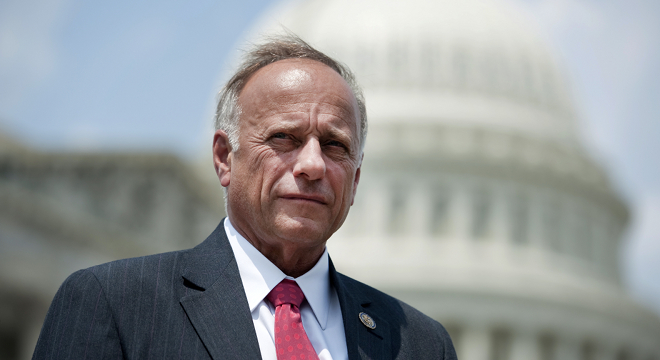House Republicans who voted against final passage of the Violence Against Women Act are taking credit for helping renew the domestic abuse legislation.
The lawmakers’ desire to have it both ways reflects the irreconcilable tension between wanting to appear on the right side of an extremely popular issue and wanting to preserve their credibility with conservative groups who vowed to punish those who voted for VAWA.
Rep. Steve King (R-IA), a potential Senate candidate in 2014, said in a statement that he supported the bill because he understood “the importance of reauthorizing VAWA.”
“I supported this legislation because I know how important it is to empower women in difficult situations,” King said. “If a woman is at risk, she should know that she has a place to turn for support and assistance. I supported VAWA in 2005, 2012, and today I voted in support of the House version to see that victims of domestic violence and sexual assault have access to the resources and protection when they need it the most.”
What King didn’t mention is that he voted against House passage of VAWA. Instead he voted for a more modest Republican substitute, which failed. Had his final vote carried the day, VAWA would remain expired and its reauthorization in limbo today.
Same goes for Rep. Vicky Hartzler (R-MO), who voted for the GOP version but against the final VAWA, and yet took credit for its passage.
“I am pleased to support efforts to protect all women in this country from domestic abuse and other forms of violence,” Hartzler said in a statement. “Violence against women, in all its forms, is unacceptable.”
A Hartzler spokesman told McClatchy that the statement was not intended to deceive.
This tactic was used by multiple House Republicans who voted 87-138 against final passage of VAWA. They voted for the failed GOP alternative. The final VAWA, which passed 78-22 in the Senate, cleared the House 286-138, with mostly Democratic votes.
Those Republicans want to protect themselves from right-wing challengers, who might invoke vote scorecards from groups like Heritage Action and the Club For Growth to call into question their conservative credentials. (Conservatives objected to expanded protections for gays and illegal immigrants, and questioned the constitutionality of tribal land provisions.) But the GOP lawmakers also don’t want their constituents to know they ultimately voted against passage of legislation aimed at helping women who are victims of domestic violence and rape.
Western Pennsylvania Republican Reps. Keith Rothfus and Tim Murphy were called out by their local paper for issuing similar, misleading statements about their votes on VAWA — “Rothfus Votes to Reauthorize Violence Against Women Act” and “Murphy Votes To Reauthorize Violence Against Women Act.” Both voted for the GOP version but against final passage.
As reported by MSNBC’s Steve Benen, and picked up by Huffington Post, other Republican congressmen who touted their support for VAWA while voting against the final reauthorization included Reps. Tim Griffin (R-AR), Tim Walberg (R-MI) and Bill Johnson (R-OH).
Some Republicans were more forthcoming about how they handled their dilemma.
“Unfortunately,” said Rep. Robert Pittenger (R-NC), “today Congress chose not to approve the most effective version of the Violence Against Women Act, but this will not deter me from continuing to support efforts to protect women.”






